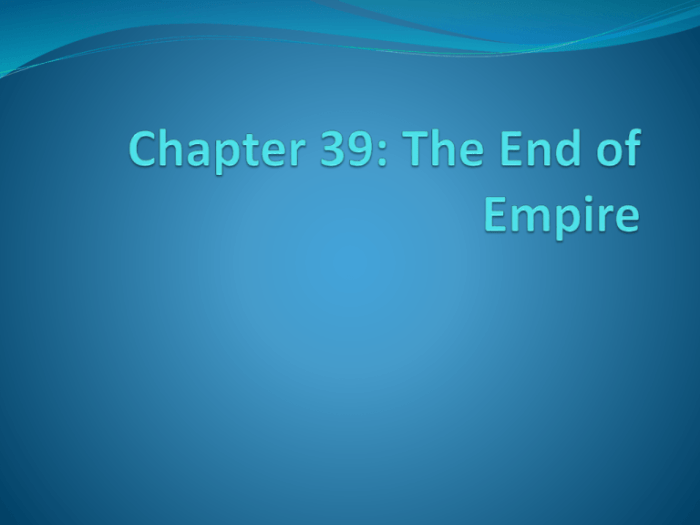Harvest of Empire Chapter 1 Summary embarks on a historical journey, unraveling the intricate tapestry of European colonization in Africa. This chapter lays the foundation for understanding the profound impact of imperialism on African societies, setting the stage for a narrative that delves into the exploitation of natural resources, cultural assimilation, and the indomitable spirit of resistance.
The chapter meticulously examines the motivations and methods employed by European powers as they carved out their empires across the African continent. It sheds light on the devastating consequences of colonization, including the disruption of traditional African societies and the horrors of the slave trade.
Introduction: Harvest Of Empire Chapter 1 Summary

The “harvest of empire” is a term used to describe the economic and political exploitation of colonies by their imperial powers. This exploitation can take many forms, including the extraction of natural resources, the establishment of plantations, and the imposition of forced labor.
The term was first coined by historian Eric Williams in his 1944 book, Capitalism and Slavery, and has since been used by other historians to describe the impact of colonialism on Africa, Asia, and Latin America.
Chapter 1 of Harvest of Empireprovides a historical context for the term and explains its significance in the overall narrative of the book. Williams argues that the “harvest of empire” was a major factor in the development of capitalism and that it played a key role in shaping the world we live in today.
The Colonization of Africa

The colonization of Africa began in the 15th century with the arrival of Portuguese traders on the coast of West Africa. Over the next few centuries, European powers established colonies throughout the continent. By the end of the 19th century, almost all of Africa was under European control.
The motives for European colonization were complex and varied. Some Europeans were motivated by a desire for wealth and power, while others were motivated by a desire to spread Christianity or to “civilize” the African people. Whatever their motives, the impact of colonization on African societies was profound.
Colonization led to the loss of African land, resources, and independence. It also led to the disruption of African cultures and traditions. The slave trade, which was a major part of the “harvest of empire,” had a particularly devastating impact on African societies.
The Exploitation of Natural Resources
One of the main ways that European powers exploited their colonies was through the extraction of natural resources. Africa is rich in natural resources, including gold, diamonds, copper, and oil. European powers used these resources to fuel their own economies and to generate wealth for themselves.
The extraction of natural resources from Africa often had a devastating impact on the environment. Mining and logging operations polluted the air and water, and they destroyed forests and wildlife habitats. The exploitation of natural resources also led to the displacement of African people from their land.
The Cultural and Social Impacts of Colonization
Colonization had a profound impact on African cultures and traditions. European powers imposed their own languages, religions, and education systems on their colonies. This led to the erosion of African cultures and traditions.
Colonization also led to the division of African societies along ethnic and religious lines. European powers often favored one group over another, which led to conflict and tension. The legacy of colonization continues to shape African societies today.
The Resistance to Colonialism
Despite the overwhelming power of European powers, there was widespread resistance to colonialism in Africa. This resistance took many forms, including armed rebellion, passive resistance, and cultural resistance.
African leaders such as Kwame Nkrumah, Nelson Mandela, and Patrice Lumumba played a key role in the anti-colonial movement. These leaders inspired their people to fight for independence and they helped to lay the foundation for the post-colonial era.
The Legacy of Colonialism, Harvest of empire chapter 1 summary
The legacy of colonialism is complex and multifaceted. On the one hand, colonialism brought about some positive changes, such as the introduction of modern medicine and education. On the other hand, colonialism also had a number of negative consequences, such as the loss of land, resources, and independence.
The legacy of colonialism continues to shape African societies today. Many African countries are still struggling to overcome the challenges that were created by colonialism. However, there is also a growing sense of hope and optimism in Africa. The continent is home to a number of dynamic and rapidly growing economies, and there is a new generation of African leaders who are committed to building a better future for their people.
Commonly Asked Questions
What is the significance of Chapter 1 in Harvest of Empire?
Chapter 1 sets the stage for the entire narrative, providing historical context and defining the concept of the “harvest of empire.”
How did European colonization impact African societies?
Colonization disrupted traditional African societies, leading to social, economic, and cultural upheaval.
What role did the slave trade play in the “harvest of empire”?
The slave trade was a central component of the “harvest of empire,” serving as a major source of wealth and labor for European powers.